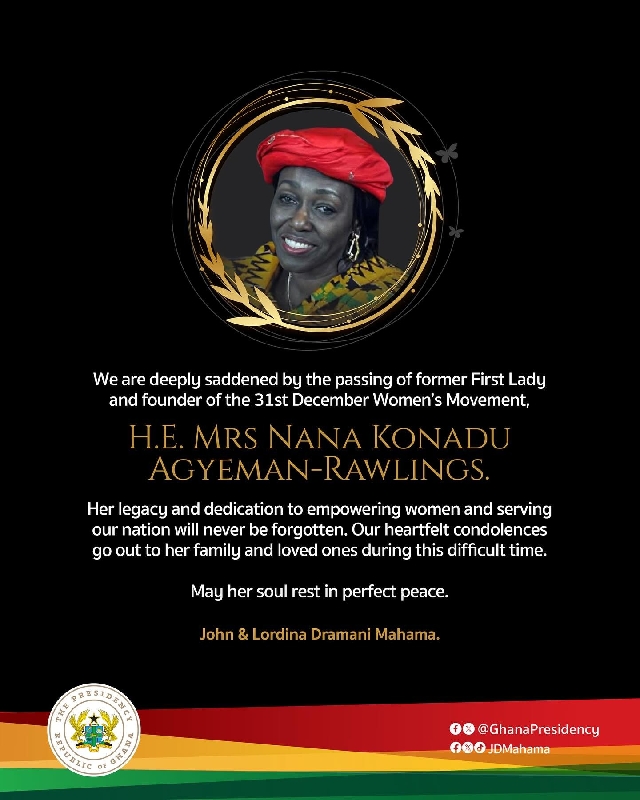Nana Konadu Agyeman-Rawlings, the catalyst for women’s empowerment in Ghana
 Nana Konadu Agyemang-Rawlings
Nana Konadu Agyemang-Rawlings
When Nana Konadu Agyeman-Rawlings passed away on 23 October 2025 at the age of 76, Ghana lost the leading champion of women’s economic empowerment.
Her name will be remembered not simply for her role as First Lady but for the movement she led that helped Ghanaian women reclaim their place in the economy, become business owners, and build legacies of their own.
The relevance is clear.
This is the story of how empowerment, entrepreneurship and infrastructure came together to forge new opportunities and what today’s women can learn from that example.
Early on, Nana Konadu understood that meaningful empowerment would begin with income generation.
She founded the 31st December Women’s Movement in 1982 to mobilise rural and urban women alike into productive ventures.
Through training in small-scale processing, group enterprises and savings cooperatives, countless women took the leap from dependence to enterprise.
Cassava-to-gari processing, palm-oil extraction, soap-making cooperatives, garment workshops and market trading units emerged under her guidance.
These modest ventures were powerful because they used local resources, local demand and collective will.
They allowed women to earn incomes, reinvest in their businesses, educate their children and transform their communities.
The economic significance of this work cannot be overstated.
These enterprises contributed to rural economic activity, strengthened value addition and created linkages between farm production and downstream processing.
In doing so, they helped reduce import dependency for certain goods, improved household incomes and increased the contribution of women-led businesses to Ghana’s informal and formal economies. In towns across Ghana, women’s cooperatives emerged as suppliers to larger markets, sometimes even to urban wholesalers.
The ripple effects included more stable household consumption, greater savings, improved schooling for children and communities more resilient to economic shocks.
From Small Ventures to Value Chains
Nana Konadu’s vision was not merely to encourage women to trade but to equip them to create value-added enterprises.
The shift from raw produce to processing is at the heart of her legacy. Instead of women selling palm fruits cheaply to intermediaries, they learned how to process oil, package and trade finished goods.
Instead of subsistence gari production as a home activity, they began to form groups, organise production and connect with markets in nearby towns and cities.
These moves elevated women’s economic status, provided greater earnings and helped establish women as stakeholders in Ghana’s value chains.
By building capacity at the grassroots level, Nana Konadu laid the foundation for what we today call women-led SMEs.
Many of these businesses have grown, diversified and inspired younger women to follow suit.
They show that with the right support, modest beginnings can turn into scalable operations.
For the economy, the result is a stronger base of entrepreneurship, more inclusive growth and a more balanced distribution of economic activity.
Addressing Social Barriers to Work
Economic empowerment alone was not enough. Nana Konadu recognised that for women to thrive in business, they needed practical support, especially in reconciling caregiving responsibilities with income-earning work.
The movement established community-based day-care centres and pre-schools, thus enabling mothers to engage in economic activities while their children were supervised and educated.
This approach acknowledged the reality of women’s dual roles and removed a key barrier to participation in enterprise.
In parallel, the movement provided adult literacy programmes, savings-and-loan co-operatives and leadership training. Women who had been illiterate, financially excluded or socially sidelined were brought into networks, organised groups and business training schemes.
By doing so, Nana Konadu bridged the gap between aspiration and execution, equipping women with the tools to claim agency, build businesses and shape their futures.
Legal and Institutional Foundations for Empowerment
Empowerment in Ghana under her leadership was not simply about business ideas; it was anchored in social justice and rights. One landmark outcome of her advocacy was the work around securing inheritance and property rights for women.
By advancing reforms such as the Intestate Succession Law, women gained greater security in home ownership, savings and investments.
These rights underpin business activity since entrepreneurs who lack legal access to assets or property are constrained in growth.
By combining business training, rights protection and social infrastructure, Nana Konadu created a holistic model.
Women did not operate in isolation; they worked in networks, accessed credit, owned assets and functioned as economic citizens, not just labourers.
This has profound implications for business development, investment and growth.
It means that when women own, invest, and lead enterprises, the economy becomes richer and more diversified.
Practical Lessons for Women in Business Today
For Ghanaian women who aspire to build businesses or recover lost momentum, the following lessons stand out from the Konadu legacy:
Begin at the grassroots – small processing units, savings groups and micro-enterprises can form the base of larger ventures.
Build infrastructure support – whether it is childcare, training, literacy or a savings cooperative, enabling structures matter.
Secure your legal and asset rights – property, inheritance, savings, access and organisation count as much as business ideas.
Add value, move up the chain – selling a raw commodity is a start; processing it, branding it and scaling it makes a difference.
Network, collaborate and lead – join cooperatives, mentorship groups or peer platforms that amplify your impact and capacity.
Ensuring the Legacy Lives On
In an era of digital entrepreneurship, global value chains and competitive markets, the Konadu approach remains relevant. Women must continue innovating and adapting, transforming small ideas into enterprises that matter.
They must use technology, market insight and collaboration to scale.
Institutions must recognise women-led enterprises as growth drivers, integrate them into policy frameworks and support their expansion with training, financing and infrastructure.
Most importantly, the culture of enterprise for women must become legacy-driven.
Just as Nana Konadu turned gari processing, palm oil and savings groups into business vehicles, today’s women must view their work as part of a broader economic story.
Whether you are a young woman starting out, a mother returning to trade, or an entrepreneur recovering from setbacks, you have everything you need to build anew.
Her legacy says: nothing is impossible if you rise to the occasion.
A Call to the Next Generation
For young women, mothers and entrepreneurs who might have paused due to health, family or other battles, the message is clear. You are not defined by the delay, the challenge or the fall.
You are defined by your next move, your resilience and your impact.
The life of Nana Konadu shows that greatness emerges less from circumstance and more from purpose, perseverance, and collaboration.
Every woman in Ghana can turn a modest idea into an enterprise, a burden into a business and a hope into a legacy.
As you work, build, invest and innovate, remember that you stand on the shoulders of a giant whose mission was to empower, equip and elevate. Honour that mission by making your mark.
When the story of Ghana’s economic transformation is written, it will not ignore the contributions of women.
And when it is written, it must recognise that one of the strongest catalysts of that transformation was Nana Konadu Agyeman-Rawlings.
Not because of her title but because of her action, not because of her ceremony but because of her service.
She enabled women to become business owners, producers and decision-makers in Ghana’s economy.
In every small processing unit turning palm fruit into oil, every cooperative packaging local products, every woman balancing trade and motherhood and every young girl dreaming of enterprise, her spirit lives on.
The lesson is bold and timeless: work with your hands, think with your mind and build for tomorrow.
Because your small thing can become your big thing, and the wealth you build is not just for you but for generations to come.
-By Elikem Adiku
Source: Classfmonline.com
Trending Features

Why V. L. K. Djokoto could be Ghana’s future
17:37
Fighting a silent killer: How vitamin C could transform triple-negative breast cancer outcomes for young African women
15:38
Technology meets tradition: How smart health is trying to deal with diabetes
11:51
Nana Konadu Agyeman-Rawlings, the catalyst for women’s empowerment in Ghana
12:44
Gold, poison and kidneys: A true story Ghana must hear
12:24
President Mahama’s China diplomacy powers Ghana’s 24-hour economy and green transformation
12:53
How to survive Law School: My honest reflections
13:14
Beyond A and B schools: Addressing educational inequality through political reform
18:30




